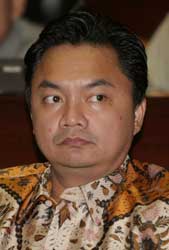Institute for Defence Studies and Analysis [India]
August 25, 2010
IDSA COMMENT
Indonesia and the challenge of Papuan separatism
Bilveer Singh
Introduction
If there are any symbols of Papuans’ continued quest and determination for sovereign independence1, it is their continued attachment to their flag, the Morning Star or Bintang Kejora (in Indonesian), their Anthem, Hai Tanahku Papua (in Indonesian) or Oh, My Land Papua, written by a Dutch missionary in the 1930s and the continued existence of the OPM, Papua Independence Movement since 1964. The Morning Star was first formally unveiled on 1 December 1961, symbolising the onset of the Republic of West Papua and flew till October 1962, when the former Dutch colony was transferred to the United Nations Temporary Executive Authority through a deal brokered by the United States, mainly to prevent Indonesia from joining the Soviet Camp during the Cold War. Indonesia took control of the territory in the following year and formally incorporated West Papua, renamed West Irian, into Indonesia in 1969, recognised by the United Nations. However, Papuans have continued to challenge the territory’s integration into Indonesia and a bloody struggle has ensued ever since, with supporters of Papuan independence claiming that more than 100,000 Papuans have been killed by the Indonesian military. The violence has continued right to the present period and it remains illegal to fly the Bintang Kejora in Indonesia and many Papuans continue to be incarcerated for doing so.
Anatomy of Papua
Located on the easternmost part of Indonesia, geographically it constitutes one-fifth of the country but only has a population of 3 million (of which the natives constitute only 50 per cent). Indonesia, where 90 per cent of the people are Muslim, has a population of nearly 240 million. Papua is a largely Christian territory, where the Protestants constitute the majority, followed by the Catholics and then Muslims. However, tribalism is extremely dominant with more than 265 tribes representing the Putra Daerah or Sons of the Soil (natives). Yet, the territory is extremely rich in natural resources, especially oil, gas, gold and copper. It is also geo-strategically important, bordering on land with Papua New Guinea and fronting the Pacific Ocean.
Explaining Papuans’ Desire for Independence
Even though Indonesia declared independence in August 1945 and had to fight the Dutch to gain complete sovereignty in December 1949, the Dutch only surrendered Papua in October 1962. This represents an important historical anomaly as Papua remained for another 12 years as a Dutch colony compared to the rest of Indonesia. This provided the Dutch ample time to develop a local Papuan elite that was committed to independence and hence the importance of the Morning Star, National Anthem, not to mention a rudimentary Parliament that was formed in Jayapura in 1961. However, due to the Cold War, President Kennedy succeeded in pressurising the Dutch to surrender the territory in 1962 and Indonesia, with the support of the West, legitimately gained control of the territory by 1969. However, this was largely undertaken against the wishes of the Papuan elites and hence the continued struggle for Merdeka or independence ever since.
From the perspective of Papuans, there are a number of grievances that have provided a catalyst and triggered their demands for independence. First, the sense of historical injustice when Papua was handed over to Indonesia by the Dutch in 1962 without consulting Papuan elites and later, the fraudulent manner in which the referendum, called Act of Free Choice (but what the Papuans call Act of No Choice) was held in 1969. Thus, for the Papuans, Indonesia is an illegal colonizer and the territory’s status should be reviewed through a referendum. Second, gross unhappiness in the manner Jakarta has flooded the territory with non-Papuans, mostly Muslims, thereby creating what Papuans refer to as ‘demographic and cultural genocide’ and where they are fast becoming minorities in their own land. This has also intensified social-cultural conflicts between the natives (Putra Daerah) and the transmigrants (Pendatangs), the latter usually backed by officialdom.
Third, demographically, Papuans feel discriminated against, with the majority Malay Indonesians looking down on the Melanesian Papuans (for their dress code, eating and drinking habits, etc) and worst still, most privileges being given to the former at the expense of the latter.
 Ambassador Djalal was a defender of the Suharto dictatorship, and his career involved him in brutal repression. While defending the Indonesian security forces in East Timor (now independent Timor-Leste), he would often attack human rights investigators and organizations. He sought to portray the violence there as civil conflict among East Timorese, rather than resulting from repression of resistance to Indonesia's illegal and brutal occupation.
Ambassador Djalal was a defender of the Suharto dictatorship, and his career involved him in brutal repression. While defending the Indonesian security forces in East Timor (now independent Timor-Leste), he would often attack human rights investigators and organizations. He sought to portray the violence there as civil conflict among East Timorese, rather than resulting from repression of resistance to Indonesia's illegal and brutal occupation.


